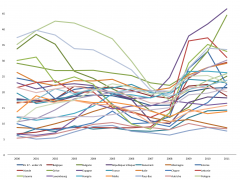-

Paris, no place for late night shopping?
On September 27, some 70 employees of the French hardware store chain Leroy Merlin gathered in Créteil, a suburb of Paris, not to demand higher wages or shorter hours, but the right to work on Sunday. In a country that prides itself on its carefree lifestyle and boasts one of […]
Author Archive
-

Malthus and Climate Change
In 1798, Thomas Malthus published An Essay on the Principles of Population in which he famously argued that the population increases in a geometric ratio, while the means of subsistence increase arithmetically. This means that if unchecked, population growth will inevitably lead to crises. Malthus wrote his theory when the population […]
-

The ‘cultural exception’ in a digital age
The digital era is transforming the way in which people consume cultural products. It’s not uncommon for younger consumers to have neither a television nor a radio because the internet meets all their cultural needs from streaming and downloading music to television, movies, books and news on demand from anywhere […]
-

Good Jobs vs. Any Jobs: Do we have to choose?
In countries hardest hit by the global financial crisis, unemployment for young professionals can reach nearly 50%, far superior to unemployment rates among the active population over 25. For those lucky enough to find jobs, they are often precarious short-term contracts that offer little hope of future stability, even for […]
-

Death of a Reformer: The man who “modernized” France’s elite university
Richard Descoings, the former Director of France’s prestigious Sciences Po found dead in his New York hotel room April 2nd, left few indifferent in his decades-long crusade to reform French education. He was the driver behind the “modernization” of an archaic admissions system, leading to a far bigger, […]
